Diffuse Mesothelioma Payment Scheme Annual Statistics April 2014 to March 2020 (HTML)
Published 26 November 2020
Overview
These statistics include data relating to the Diffuse Mesothelioma Payment Scheme (DMPS) from 1 April 2014 to 31 March 2020 inclusive, including:
- number of applications received
- success rates
- payments
The DMPS was launched throughout the UK on 6 April 2014. It provides payments to eligible sufferers of diffuse mesothelioma (or their eligible dependants) who were negligently exposed to asbestos during a period of employment, but who are unable to take legal action to seek financial redress through the civil courts. The DMPS is paid for via a levy on the employers’ liability insurance industry.
Following a consultation process in June 2020, the Department for Work and Pensions (DWP) discontinued the release of Official Statistics for the DMPS. This report (together with accompanying tables) contains the same information as the previous Official Statistics but will be published each November with the DMPS Annual Review.
These statistics include data relating to the DMPS including the number of applications received, success rates, and payments, from 1 April 2014 to 31 March 2020 inclusive.
Headline statistics
| Date | Applications received |
|---|---|
| April 2019 to March 2020 | 315 |
| April 2014 to March 2020 | 2185 |
| Date | Application Success Rate (excluding pending applications) |
|---|---|
| April 2019 to March 2020 | 79% |
| April 2014 to March 2020 | 72% |
| Date | Total Amount Paid |
|---|---|
| April 2019 to March 2020 | £32.7 million |
| April 2014 to March 2020 | £205.2 million |
What you need to know
The DMPS was established under powers set out in the Mesothelioma Act 2014. It makes payments to people diagnosed with diffuse mesothelioma on or after 25 July 2012 who contracted the disease as a result of negligent exposure to asbestos at work in the United Kingdom, and who are unable to claim damages because the employer no longer exists and the employer’s liability insurer cannot be traced. Payments can also be made to eligible dependants of those sufferers who died from the disease before they could make an application to the Scheme.
The Scheme is funded by a levy on the insurance industry. To meet the full costs of the Scheme, regulations require active employers’ liability insurers to pay an annual levy based on their relative market share. This levy encompasses the capital payments made to applicants, administration costs, and costs associated with collecting the levy.
The levy in 2019 to 2020 was set at £33.3 million.
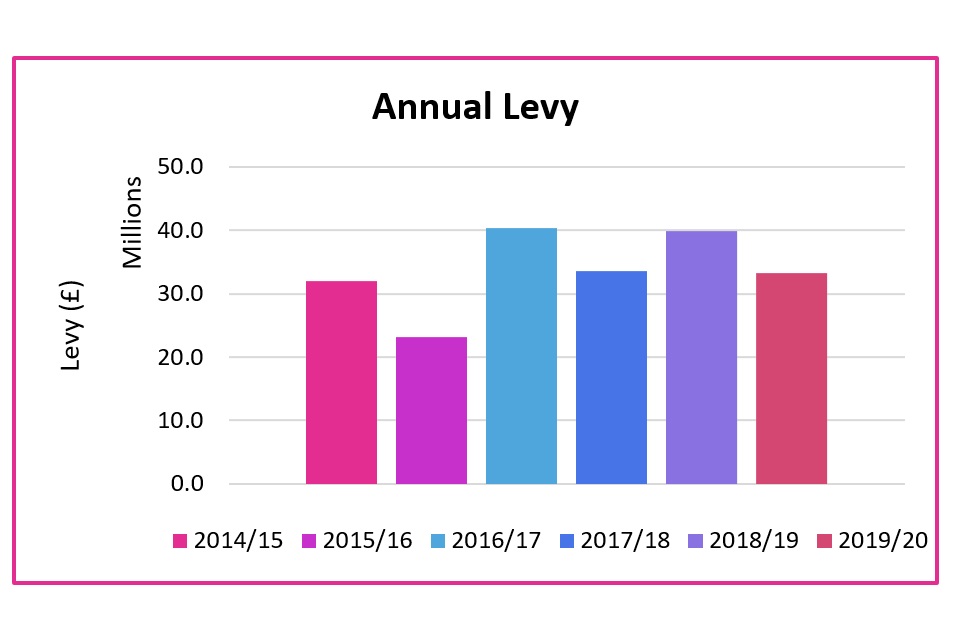
Statistics relating to the Scheme are currently released annually and are sourced from data originally collected by the Scheme Administrator appointed to act on behalf of the DWP. To reflect any updates, where possible, the full historical statistical series will be refreshed with each release, and so previous figures may be updated (for example, the historical series has been updated to show whether pending decisions have become successful or unsuccessful since the previous publication). Due to changes in Scheme Administrator from 1 April 2018 we have been unable to continue updating the historical series for the demographics and characteristics of applicants between April 2014 to March 2018. These figures therefore remain broadly the same as they were at the end of March 2018 but also include applications received by the new administrator prior to 1 April 2018.
Notes about the data
All the information underpinning the data featured in this document is included in the accompanying ODS tables.
The data contained herein covers the period from 1 April 2014 to 31 March 2020. It is acknowledged that the scheme did not open to receive applications until 6 April 2014.
To avoid disclosing information about individual applicants, all volumes have been rounded to the nearest 5, percentages to the nearest 1 percent, total payments to the nearest £0.1 million, and average payments to the nearest £1000. Consequently, there may be slight discrepancies in total figures due to rounding.
Applications
In the financial year 1 April 2019 to 31 March 2020, 315 applications have been received. This is approximately 18% fewer than in 2018 to 2019.
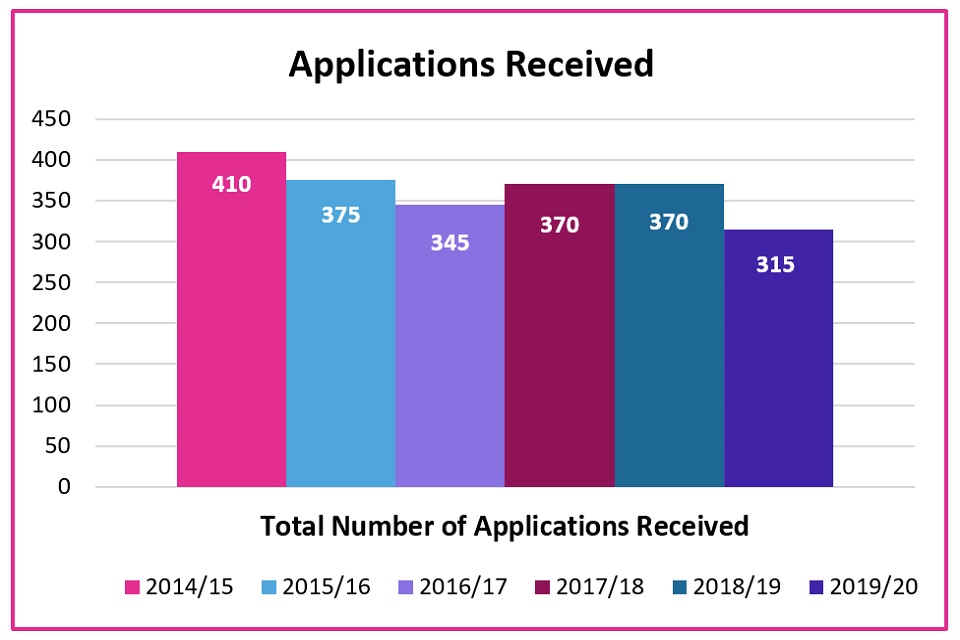
In the financial year 1 April 2019 to 31 March 2020, on those applications where a decision has been reached, 79% have been successful, 18% unsuccessful and 3% withdrawn.
Since 2014, 72% of applications where a decision has been reached, have been successful.
35% of the total number of applications received in the year 2019 to 2020 were still pending a decision as of 31 March 2020. These pending applications are made up of those recently received and those where extra information is awaited before a decision can be made. In most cases, this extra information relates to ongoing enquiries to determine whether an alternative civil claim is possible.
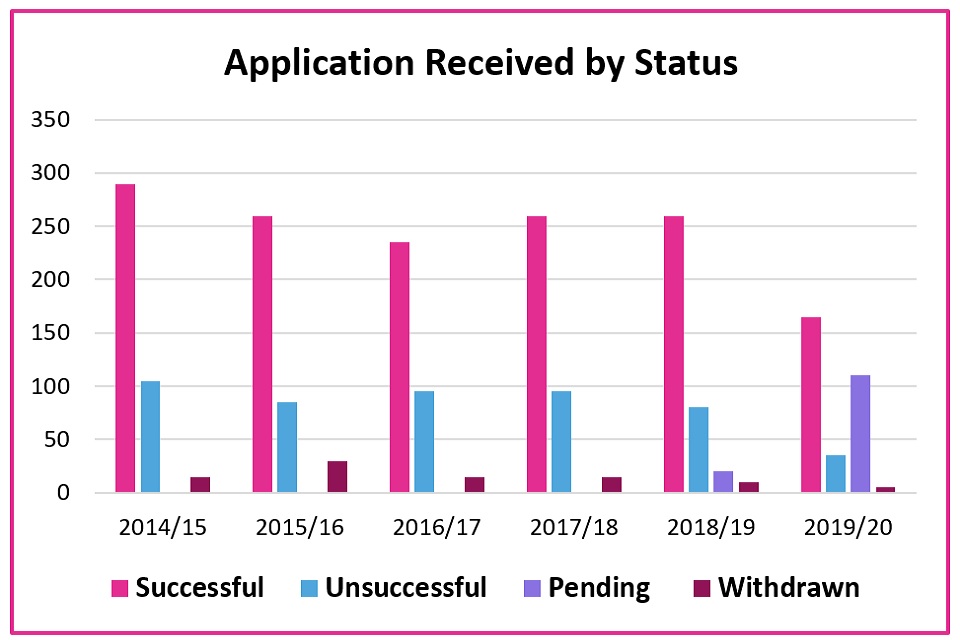
In the last 12 months, 90% of applications required more information than was initially provided before a decision could be made.
| Initial application 2019 to 2020 | 2019 to 2020 (%) |
|---|---|
| Initial application contained all necessary evidence and information | 10% |
| Initial application did not contain all necessary evidence and information | 90% |
Where an applicant believes they are entitled to claim, early completion of the application is encouraged. The Scheme Administrator acknowledges receipt and holds the claim until all the necessary evidence is provided by the applicant. Some evidence can be more difficult to obtain – for example, when the applicant is attempting to trace ex-employers/employers’ liability insurers despite a significant amount of time having passed since their employment.
Applicants
Gender
The majority of applicants are males over the age of 65.
The vast majority of applicants (88% in the last 12 months and 92% since 2014) are male. This trend reflects those professions where exposure to asbestos, and therefore the risk of suffering from diffuse mesothelioma have been high – for example, carpenters, plumbers, electricians, dockworkers, ship-builders and metal workers in the 1960’s and 70’s.
In 2019 to 2020, the percentage of female applicants increased to the highest level (12%) since the scheme was established in 2014.
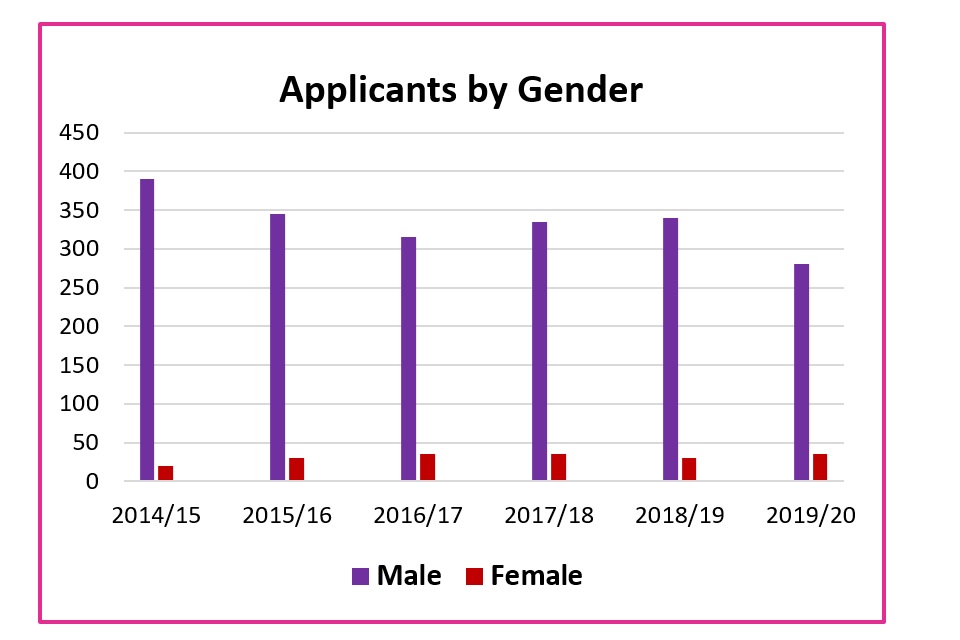
Age
There are no age restrictions on applicants, but the potential award amount depends on the age of the applicant at the date they were diagnosed. The 12 months to 31 March 2020 saw a proportionate increase in applications received from those in the 80 to 84 age range from 14% in 2018 to 2019 to 21%.
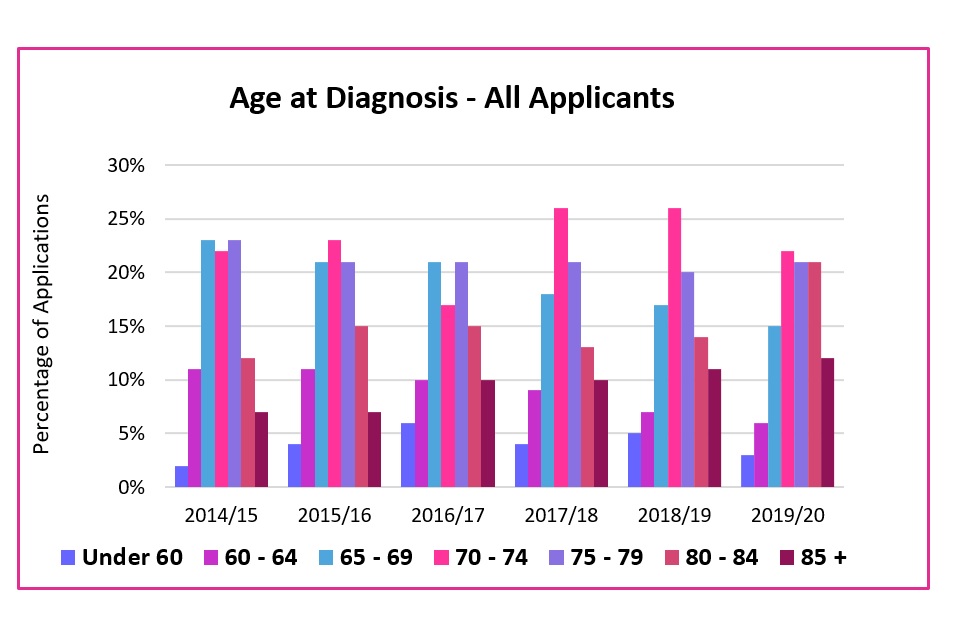
In the year 2019 to 2020, 83% of successful applicants were aged between 65 and 84. By comparison, in 2018 to 2019, 79% of successful applicants were in this age group. There was a decrease in the percentage of successful applicants under 60 to 1% – the lowest percentage since 2014.
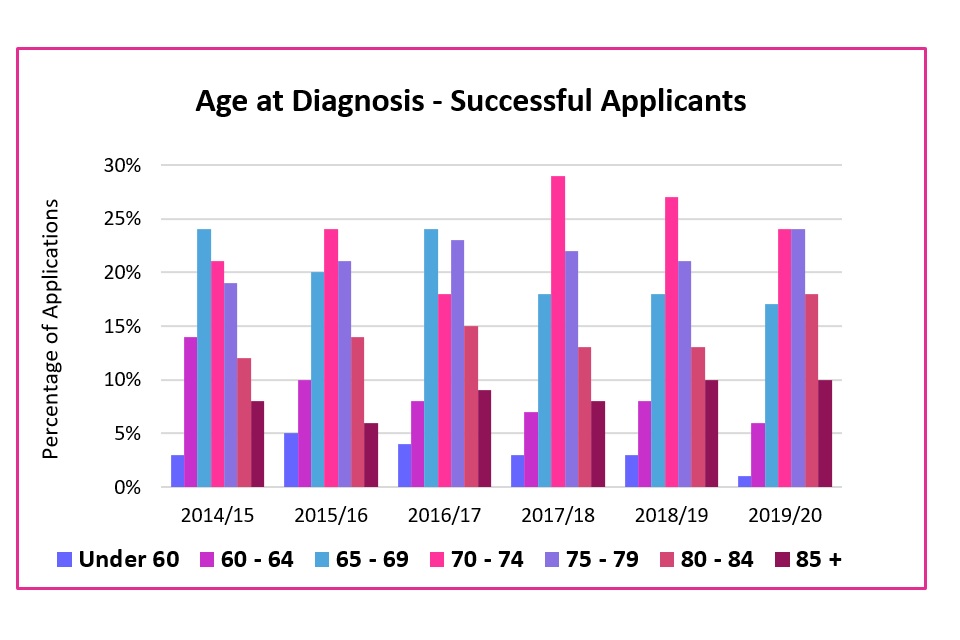
Payments
Since April 2014, the scheme has awarded £205.2 million in compensation to 1475 successful applicants.
Between April 2014 and February 2015, the Scheme regulations specified that successful applicants be paid an amount equivalent to 80% of the award that they could typically expect to have received had their claim been successfully pursued through the civil courts system.
In February 2015, the Scheme’s tariff payment was increased so that successful applicants who had been diagnosed either on or after 10 February 2015 were awarded 100% of the award that they could typically expect to have received had their claim been successfully pursued through the civil courts system.
The average (mean) payment made to successful applicants in the 12 months to March 2020 was £144,000.
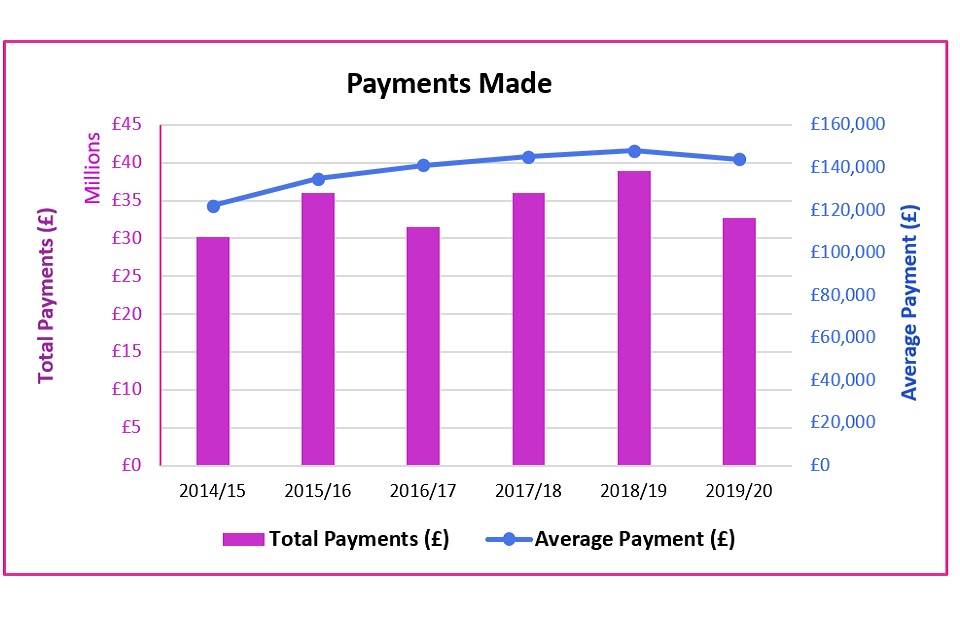
During 2019 to 2020, £32.7 million was paid out under the scheme. This is less than the £38.7 million paid out in the year 2018 to 2019 due to the fewer number of applications received in the year 2019 to 2020 and a rise in the average age of applicants.
Since April 2014, a total of £205.2 million has been paid out. This consists of £170.9 million of direct payments to applicants and £34.3 million which was repaid to DWP in respect of interim benefit payments previously made to the applicants.
Repayments to DWP are made in accordance with the well-established principle that an individual cannot receive money twice in respect of the same injury or disease. The responsibility to repay social security benefits rests with the person(s) who make the compensation payment (in this case the Scheme Administrator) and not the person suffering from the disease.
Reviews and complaints
Since the scheme began in 2014, 30% of unsuccessful decisions have been reviewed.
If an applicant disagrees with the outcome of their claim, they may request that the scheme administrator reconsiders their application. When requesting a review, the applicant should outline the reasons they believe the decision was incorrect.
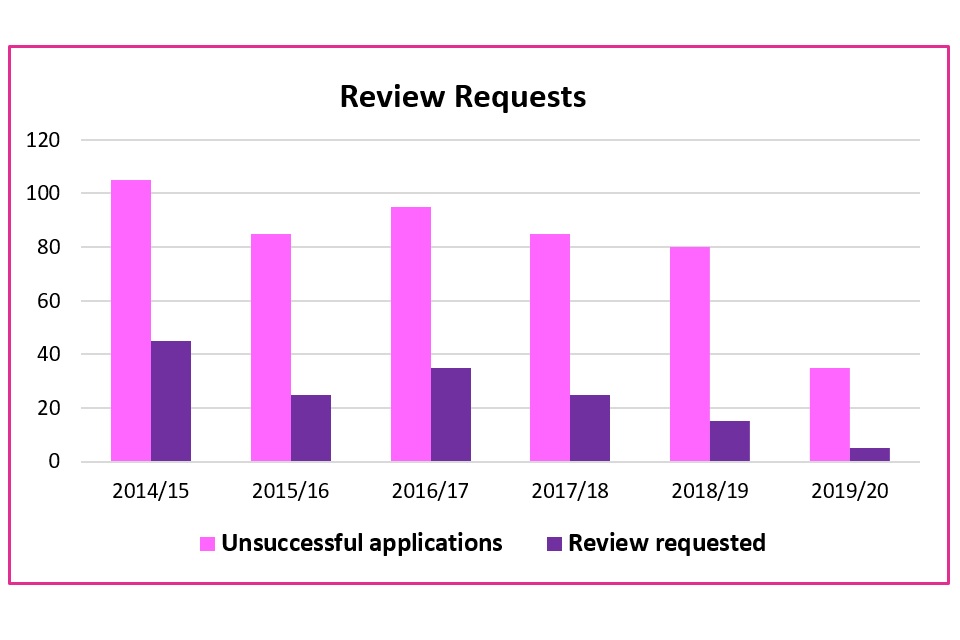
The application, including any new evidence supplied by the applicant, is reviewed by an assessor who did not issue the original decision. If an applicant remains dissatisfied once the review has been completed, they may seek to have an independent appeal tribunal (known as the First Tier Tribunal or FTT) consider their case. If the applicant’s FTT application is unsuccessful, in certain circumstances they may apply to the FTT for permission to appeal to the Upper Tier Tribunal (UTT).
315 applications were received between April 2019 and March 2020. Decisions were made on 205 of these applications by the end of March 2020 of which 165 were successful, 35 were unsuccessful and 5 were withdrawn. In respect of the 35 unsuccessful applications, 5 applicants requested a review (equivalent to 14%) and all reviewed decisions resulted in a different outcome.
For comparison, in 2018 to 2019, 370 applications were received. Decisions were made on 350 of these applications by the end of March 2020 of which 260 were successful, 80 were unsuccessful and 10 were withdrawn. In respect of the 80 unsuccessful applications, 15 applicants requested a review (equivalent to 19%) and 5 reviewed applications resulted in a different outcome. Decisions are often overturned when additional information is made available by the applicant to the Scheme Administrator.
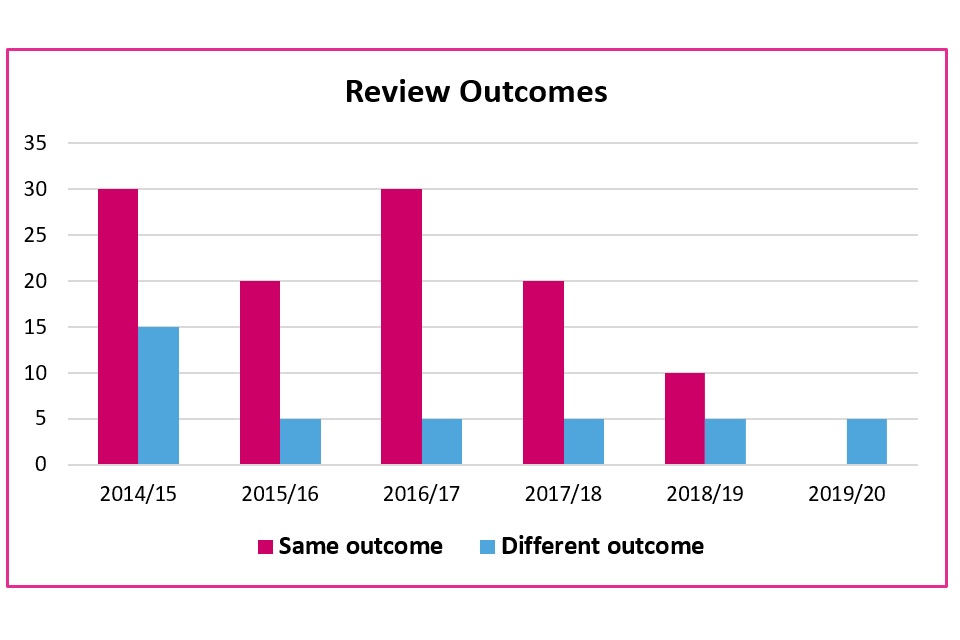
In both 2018 to 2019 and 2019 to 2020, fewer than 5 review decisions have been appealed to the FTT. There was 1 appeal to the UTT but no decision was handed down as at 31 March 2020.
There have been no official complaints made in 2019 to 2020.
Where to find out more
Useful links
Read more information about the Diffuse Mesothelioma Payment Scheme on the Diffuse Mesothelioma Payment Scheme website
Read more information about the Diffuse Mesothelioma Payment Scheme on the GOV.UK website.
Other support groups
| Organisation | Telephone | Website |
|---|---|---|
| Mesothelioma UK | Freephone helpline: 0800 169 2409 | www.mesothelioma.uk.com |
| Asbestos Victims Support Groups’ Forum UK | Telephone: 01246 380 415 | www.asbestosforum.org.uk |
| Macmillan Cancer Support | Freephone helpline: 0808 808 0000 | www.macmillan.org.uk/ |
| British Lung Foundation | Helpline: 03000 030 555 | www.blf.org.uk |
| Association of Personal Injury Lawyers | Telephone: 0115 943 5400 | www.apil.org.uk |
You can also get information and advice from any local Citizens Advice Bureau, local support groups and Trade Unions.
Feedback
We welcome feedback on the material provided with a view to improving future releases.
Please email caxtonhouse.dmps@dwp.gov.uk with any comments or suggestions.
